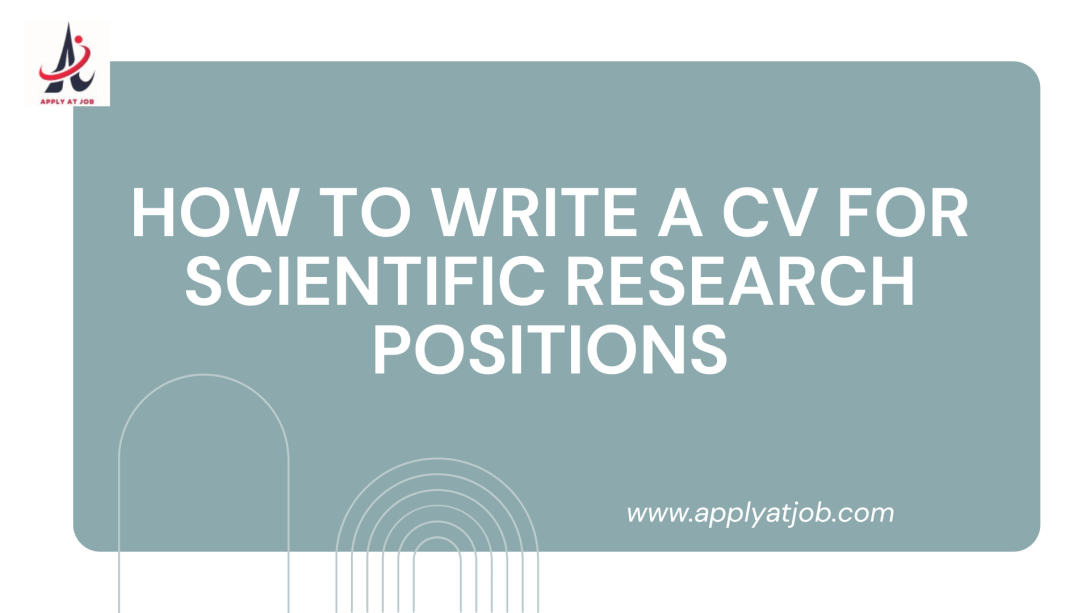
How to Craft a Resume for Jobs in Scientific Research
Writing a CV for a research employment necessitates a different strategy than other businesses since scientific research is a highly specialized subject. Candidates with technical expertise, research abilities, academic accomplishments, and occasionally even a specific publication history are sought for by recruiters, instructors, and lab directors. Here is a comprehensive guide to writing a CV that stands out for positions involving scientific research, including formatting advice, key parts, and the most effective methods to showcase your achievements.
1. Select the Appropriate CV Format for Research Jobs
An academic or scientific CV structure is typically used for research positions. Because employers expect to see all relevant projects, articles, presentations, and technical abilities, this format usually provides for more depth than a standard CV.
. Academic CV Format: Provides a complete overview of your training, publications, research experience, and pertinent abilities.
. Reverse Chronological Order: To highlight your most recent and pertinent experience, list entries under each section in reverse chronological order.
2. Provide Contact Details and a Powerful CV Header
Provide your complete name, title, and important contact details first. Provide a business email address and, if relevant, a link to your academic website or LinkedIn page.
Dr. Alex Johnson [Research Scientist | Molecular Biology] is an example header.
Phone: (555) 123-4567; email: alex.johnson@university.edu; LinkedIn: linkedin.com/in/alexjohnsonresearch
3. Create an Engaging Objective or Personal Summary
A strong summary may set the tone, even if it's not necessarily required for academic resumes. This is particularly true if you're looking for jobs outside of academia, such industrial research employment.
Example Synopsis: "Skilled molecular biologist with over seven years of experience in genetic research and a solid record of peer-reviewed journal publications." devoted to furthering cancer research and proficient in data analysis, experimental design, and molecular diagnostics. In quest of a post as a research scientist to support innovative research and ground-breaking investigations in a cooperative research team.
4. Emphasize Your Schooling
Your academic background is essential for positions involving scientific research. Provide a thorough overview of your education, including degrees, schools, graduation dates, and any noteworthy accomplishments like awards, honors, or high GPAs. For doctoral and graduate degrees, provide the title of your thesis or dissertation.
Section on Education Example:
. Molecular Biology Ph.D. Thesis: "Genomic Analysis of Tumor Evolution in Breast Cancer" University of California, San Francisco, 2020
. Stanford University Bachelor of Science in Biochemistry | 2014 Honors: Magna Cum Laude
5. Describe Your Experience with Research
The foundation of your resume is your research experience. Use particular roles, projects, and approaches to organize this area. Concentrate on your contributions and accomplishments for each project or lab, and wherever you can, quantify your outcomes.
. An example of research experience was working as a research assistant in the Department of Molecular . Biology at the University of California, San Francisco from September 2016 to December 2020.
. carried out comprehensive research on the genetic indicators of tumor spread, which resulted in a report that was published in Nature.
. increased the accuracy of detection by 15% by using CRISPR technology to examine gene alterations in cancer cells.
6. Incorporate Research-Related Technical Skills
Technical expertise is just as crucial to scientific inquiry as research experience. To illustrate your technical prowess, enumerate the procedures, tools, and software you are skilled with. If appropriate, think about classifying them into areas such as data analysis, computer languages, and laboratory abilities.
Section on Technical Skills Example:
. PCR, Western Blot, CRISPR, ELISA, and Flow Cytometry are examples of laboratory techniques.
. Data analysis with GraphPad Prism, R, Python, and SPSS
. Bioinformatics: Tools for data visualization, genomic mapping, and gene sequencing analysis
Conclusion:
creative molecular scientist with over seven years of expertise in genomes and cancer research. renowned for developing diagnostic technologies and publishing publications in Nature that have advanced cancer research. competent in grant writing, data analysis, and CRISPR, and keen to become a member of a cooperative molecular diagnostics research team.
You can visit our site: Applyatjob.com
https://applyatjob.com/hiring-employee
https://applyatjob.com/jobs




